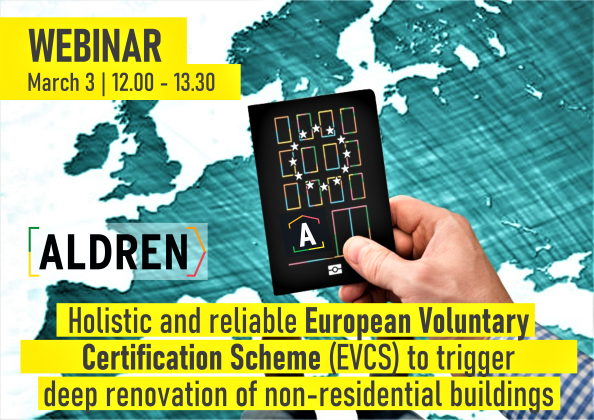This webinar provides an overview about the holistic, reliable, transparent European Voluntary Certification Scheme (EVCS) developed within ALDREN and based on mandated CEN/ISO Standards for the Energy Performance of Buildings (EPB), linking building quality to finance, aiming by design to support the implementation of the revised Energy Performance of Buildings Directive (EPBD). This ALDREN (ALliance for Deep RENovation in buildings – H2020 project) procedure is developed by public organisations, certification bodies, universities and building professionals from 7 European countries. Several additional webinars will be organised, during the 1st half of 2020, going into more technical depth of the interrelated (digital) tools composing the ALDREN procedure.
ALDREN’s main objectives are to achieve higher renovation rates and better renovation quality of buildings by overcoming market barriers. The backbone along the whole deep renovation process in the ALDREN project is an improved European Common Voluntary Certification Scheme (EVCS).
With the EU Green Deal and other actions related to climate change, being taken now at the highest level in Europe (in the Parliament, in the Council and in the Commission), tabling building renovation high on the political agenda as a flagship for tackling climate change, it seems the time is right for ALDREN to bring together key actors from the top political level (EU Parliament, EU Commission) and professionals involved in building renovations (financial institutions, major real estate companies, building professionals and industrials) and discuss about the reasons why the building renovation rate and quality is behind target and how the ALDREN procedure could help to improve the situation.
When it comes to deep renovations in buildings, the implementation chain is not coherent. Today in Europe there are at least 34 different national /regional implementations of the Energy Performance of Building Directive (EPBD), leading to different results regarding energy performance for the same building. The ALDREN project showed that, according to the assumptions taken, the main numeric indicator of energy performance requested by the EPBD could vary from 73 kWh/m2 to -5 kWh/m2.
The successful implementation of the ambitious building renovation wave, requires that the whole implementation chain, from the legislative level (the EU institutions), where the objectives are defined, to the implementation on field by qualified professionals, should be coherent, consistent, unambiguous, hence Energy Performance (EP) assessment of buildings should:
- Be comparable all over Europe;
- Be reliable (expectation should be reach in reality);
- Improve health & wellbeing (indoor air quality, climate change resilient buildings);
- Define roadmaps to nearly Zero Energy Building (nZEB);
- Favour communication between all involved stakeholders;
- Provide indicators to financial support to achieve EU climate targets.
Programme of webinar (3rd March 2020 – CET):
- 12h00 – 12h10 – Johann ZIRNGIBL, Consultant, CSTB or Mathieu RIVALLAIN, Head of Division – Energy & Environment Department, CSTB:
- Introduction to the ALDREN procedure;
- 12h10 – 12h20 – Jana BENDZALOVA, Executive manager & researcher, ENBEE:
- European Voluntary Certification Scheme (EVCS) energy ratings;
- 12h20 – 12h30 – Robert COHEN, Technical Director, VERCO:
- Addressing the gap between calculated and actual Energy Performance
- 12h30 – 12h40 – Pawel WARGOCKI, Associate Professor, DTU:
- Addressing health and well-being – TAIL indicator;
- 12h40 – 12h50 – Olivier GRESLOU, Research & Expertise project manager, CSTB:
- Linking energy performance, health and well-being to financial valuation of buildings;
- 12h50 – 13h00 – Marta Maria SESANA, Researcher, PoliMi:
- The ALDREN Building renovation passport and renovation strategies;
- 13h00 – 13h30 – Moderated Q&A.


Recent Comments